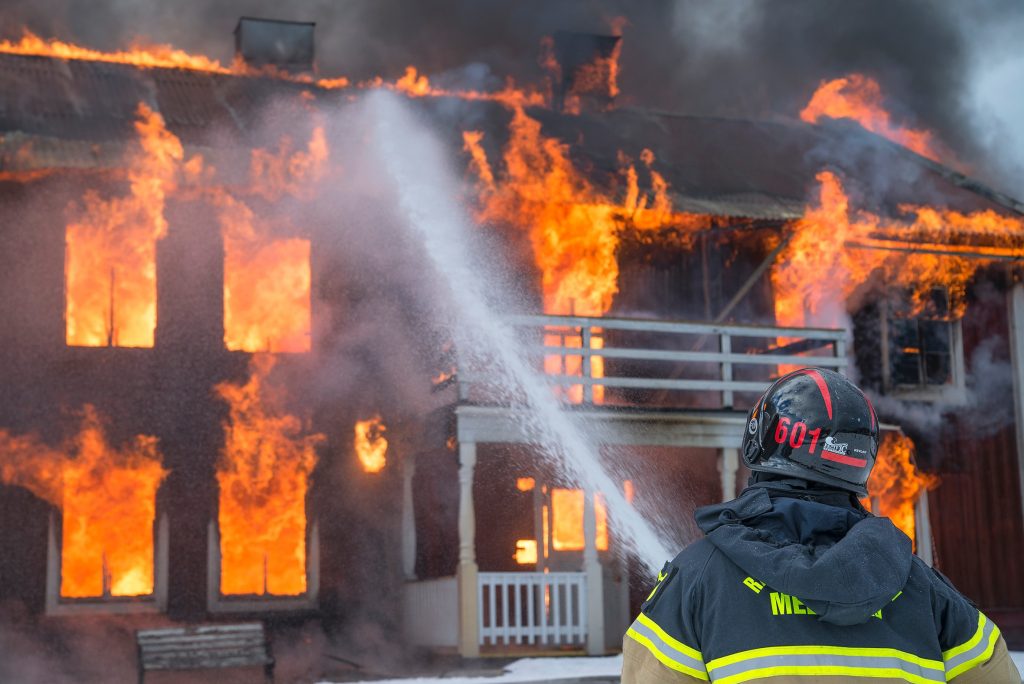While many of the fires Jim has helped fight start in typical ways, such as with wiring problems, smoking or careless actions, there are some fire starters that may seem unexpected.
EMC Loss Control Insights
Expect the Unexpected: 6 Surprising Ways Your Business Could Go up in Flames
EMC Senior Risk Improvement Representative Jim Yuill leads a double life. When he’s not working with EMC-insured companies to help keep businesses and employees safe, he’s a fire fighter. In the past 25 years, he has seen a lot of shattered dreams, ruined businesses and homes, and plenty of injuries, too. Fires must have air, fuel and a heat source to ignite. If all three elements are present, a chemical reaction, similar to the rusting of metal, can take place. If you can eliminate one of those essentials (fuel, air or a heat source) you can prevent a fire from starting. While many of the fires Jim has helped fight start in typical ways, such as with wiring problems, smoking or careless actions, there are some fire starters that may seem unexpected.

The Surprising Six
While some of the unique fires on Jim’s list occurred in residences, any of these could happen in a place of business, too. Jim’s lineup includes these six unexpected fire starters:
1. Spontaneous combustion
What can go wrong: Natural fibers tend to be the culprit in these fires. Spontaneous combustion can be triggered by oily shop rags stored in a pile in the open, clothing that has been spattered or saturated with flammable liquid residue or some types of paint, and landscaping mulch that has been sitting for a long time.
Preventive measures: Store oily rags in approved containers with a flame-proof lid. Clothing soiled with a flammable residue should be stored in fire-retardant containers until laundered. The washing machine should be outside (preferred) or in a building with an automatic sprinkler system. While the clothing may be washed, do not dry these items in a clothes dryer. To prevent heat from building up in the center of a mulch pile, move it or turn the pile frequently.
2. Dishwashers
What can go wrong: It’s hard to believe that an appliance using water can be a fire hazard, but Jim says this is how it can play out: “If there is a leak in the dishwasher, it can short out electrical components, which may lead to a fire.
Preventive measures: Perform regular checkups and routine maintenance on all appliances, including dishwashers. If you notice water or other fluids leaking, call for service immediately and don’t use the appliance in the meantime.
3. Cleaning (or other) chemicals
What can go wrong: Whether stored in a commercial kitchen with industrial shelving or in a cabinet beneath the break room sink, fires can start with stored cleaning chemicals. That’s because some cleaning chemicals are incompatible, and when mixed, become flammable.
Preventive measures: Check product labels and safety data sheets to ensure that chemicals “sit well together” before storing them in the same location. For example, don’t store a product containing acids next to a product containing a base chemical such as hydroxide. Keep containers tightly sealed, and remove any leaking chemical containers.
4. Nine-volt batteries
What can go wrong: Because the battery posts (one positive, one negative) are close together, a metal object that touches both of these at the same time can cause a short circuit, which can lead to a fire. When storing batteries or disposing of them, don’t allow them to come in contact with metal, such as steel wool, keys or items in a metal trash can.
Preventive measures: Store batteries in the original packaging or cover posts with masking, duct or electrical tape to keep the posts from contacting metal objects and other batteries. When you dispose of 9-volt batteries, don’t throw them into the trash where they might contact metal objects or other batteries. It’s much safer to treat them as hazardous waste and dispose of them at a collection site or however you dispose of other hazardous materials.
5. Birds nesting in the wrong spot
What can go wrong: Birds’ nests are made of combustible materials. If they end up on a light fixture or even on a dark metal structure that can heat up, the nesting materials can get hot enough to ignite. When nest-building occurs near electrical wiring, the nesting materials can damage and short-circuit the wires, possibly leading to a fire.
Preventive measures: Check outdoor light fixtures and other outdoor areas where birds might nest, and eliminate any nests you find.
6. Non-dairy coffee creamer (and other powdery materials)
What can go wrong: While creamer, sugar, flour and other dusty materials, including sawdust, may not be flammable, the dust they create can rapidly spread a fire. The fine particles that disperse into the air when blown or spilled near an open flame, sparks or static electricity can rapidly spread flames.
Preventive measures: Place powdery materials in tightly closed containers, and store and use them away from open flames, as well as any locations that might generate sparks or static electricity.
The information provided in this newsletter is for informational purposes only.
It is not intended to be comprehensive nor shall it be construed or relied upon as legal or medical advice.
©Copyright Employers Mutual Casualty Company 2018. All right reserved.
